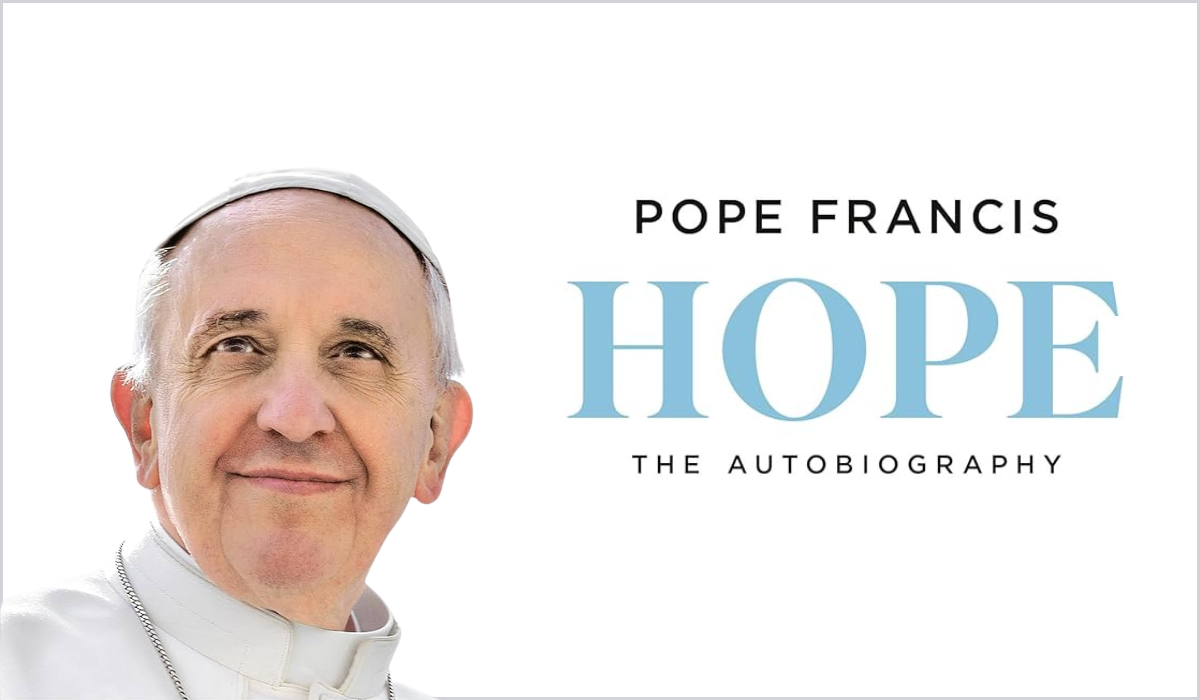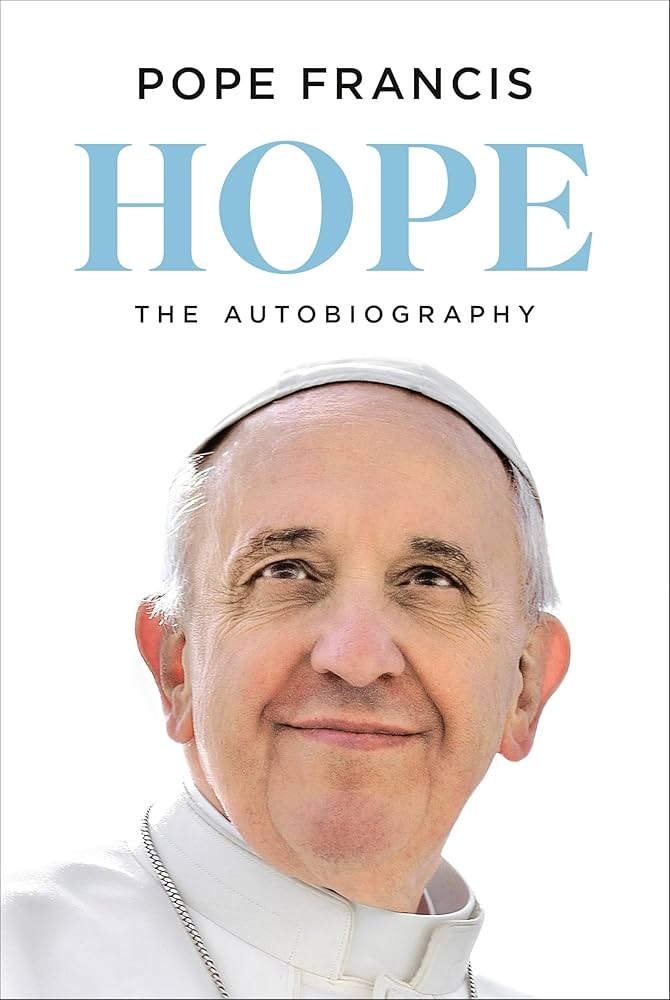Pope Francis Offers the Light and Humor Every One of Us Needs Right Now
This past week, Pope Francis released Hope: The Autobiography, a work of heart, depth, and brilliance. The book is the first autobiography to be published by a Pope. It spans Pope Francis’s life, starting with his Italian roots and continuing through his youth to his adult life and papacy. As the title suggests, its pages are filled with hope and deep wisdom. Below is an excerpt from the book where the Pope tells of the vital role humor plays in our lives.
AN EXCERPT FROM “HOPE” BY POPE FRANCIS
HOPE IS AN amusing child too. She knows that humor and a smile are the leaven of existence and a means of facing difficulties, even major worries, with fortitude. The writer Romain Gary's perceptive definition of humor fits well: "It is an affirmation of dignity, a declaration of man's superiority to all that befalls him."
In my family, when I was a child, it was also used by our parents for educational purposes. We had some fine comedians in Argentina. One of these was the actress Nin Marshall, whom the government then banned from the radio in 1940 and in 1943, as well as from the cinema, and she was effectively forced into artistic exile under the dictatorship of Pedro Pablo Ramírez. There was also Pepe Biondi, the son of Neapolitan migrants in the barrio of Barracas, which takes its name from the large numbers of warehouses, shacks, and slaughterhouses that began to appear along the banks of the Río Matanza from the 1700s. He came from very humble origins, and remembered how his father had chosen to immigrate to "Baires" because he had been told the streets were paved with gold, only to dis-cover, when he arrived, that they weren't even metaled, and that if he wanted to eat, he had to find it himself. Pepe started as a child acrobat in the circus to give his family one less mouth to feed, then became famous throughout South America thanks to his theater, film, and television appearances, with his distinctive innocent and clownish style. But I remember the long queues at the movie theaters for El pequeño mundo de Don Camilo (The Little World of Don Camilo), the comedy masterpiece by Giovannino Guareschi interpreted by Fernandel and Gino Cervi ("I'm so hungry that I could eat a bishop"). Cervi visited Buenos Aires when I was a child.
For all of us children, importance was given to education in the meaning of joy, healthy irony, or a joke. After all, humans are Homo sapiens because they are also "Homo ludens" and have a capacity to play, to have fun. This is fundamental, sooner or later, for our development as adults, to keep that wholeness that makes us complete as humans. My family life experienced no shortage of difficulties, suffering, tears, but even in our hardest moments, we discovered how a smile, a laugh, could give us that added strength to get back on track.
Papá, in particular, taught us so much. It wasn't a question of removing problems, of pretending nothing was wrong, of making light of them—comedy, after all, is tragedy seen from the other side-but rather of preserving a vital space of inner joy to face them and to overcome them.
FEW other living creatures know how to laugh: We are made in the image of God and our God smiles. We must smile with Him. We can even smile at Him, with the affection that we feel for fathers, and in the same way that we play and joke with people we love.
In this respect we can learn much from the wisdom and literature of the Jewish tradition.
Together with our elder brothers in faith, we are descendants of Abraham and Isaac, whose name literally means "he who laughs." The story, significantly, is found at the very beginning of the history of salvation in the Holy Scriptures, in Genesis, which is the first book of the Torah in the Hebrew Tanakh and of the Christian Bible.
We could say that God laughed and so it was …
The story is well known. Abraham has married Sarah, who unfortunately is sterile. They are both very, very old when God promises Abraham that within a year the couple would have a child. The Bible also describes Abraham's extremely human reaction: He fell face down on the ground and... laughed. He laughed, hiding his face as children do when they need to keep something covered. What else would we expect him to do? Then he said to himself: "Can a child be born to a man who is a hundred years old? Can Sarah give birth at ninety?" (Genesis 17:17). In other words, he wasn't very convinced. And his wife's reaction wouldn't be so different either. Moreover, as Genesis explains, "Sarah had stopped having her menstrual periods" (Genesis 18:11). And that is no surprise. So she laughed to herself and said: "Now that I am worn out and my husband is old, am I still to have sexual pleasure?" (Genesis 18:12). But as for a sense of humor, God had no equal at that time either, so everything was fulfilled exactly as He had promised; at the appointed time the old woman Sarah had a son, and she greatly rejoiced: "God has given me cause to laugh" (Genesis 21:6), she said. If our name, the name of humanity, is Hope, then it is also because we are the offspring of that child, of Isaac, the Lord of Humor. And it is a legacy that we cannot allow ourselves to squander.
To emphasize this happy marriage, this link between hope and joy, I chose to invite to the Vatican a group of over a hundred artists from the world of comedy, of various nationalities and disciplines in the months leading up to the opening of the Holy Door of the new Jubilee. Someone pointed out that it was a fine leap forward from the time when it was the fate of actors and jesters to be buried in unconsecrated ground, though for anyone who chooses to take the name of Francis, "God's Jester," it's probably the minimum that I could expect. A little later, one of them quipped that it's good trying to make God laugh... except that, being omniscient, He will know all the jokes in advance... and will ruin your punch line. This is the kind of humor that warms the heart.
From the book HOPE by Pope Francis with Carlo Musso, translated by Richard Dixon. Copyright © 2025 by Libreria Editrice Vaticana, citta del Vaticano; Copyright © 2025 by Mondadori Libri S.p.A.; English translation copyright © 2025 by Penguin Random House LLC. Published by Random House, an imprint and division of Penguin Random House LLC. All rights reserved.
Please note that we may receive affiliate commissions from the sales of linked products.




